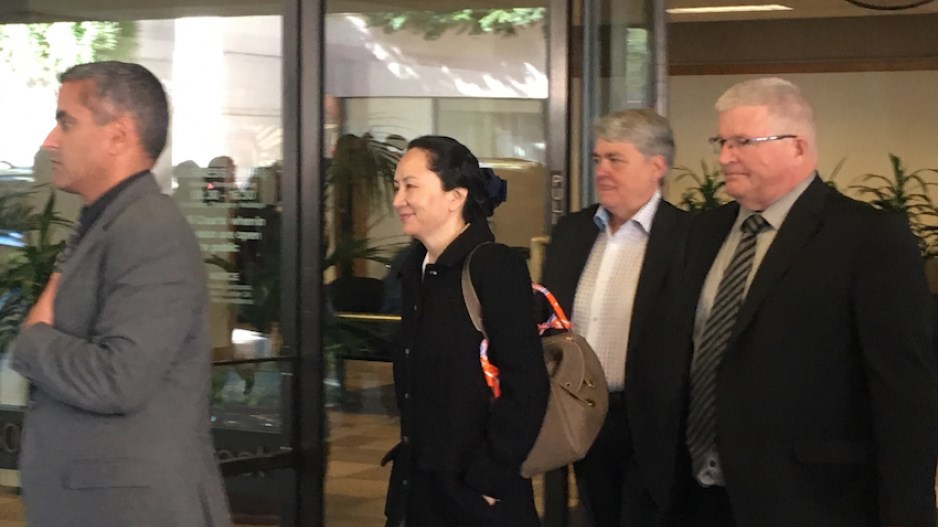The Meng Wanzhou extradition hearings began its final week of scheduled court dates this morning, as defence lawyer Mark Sandler tore into U.S. allegations that the Huawei Technologies CFO misled HSBC into violation sanctions against Iran.
The defence continued an apparent change in strategy started last week - a focus shift to U.S. allegations of fraud against Meng and the claim’s validity instead of the original focus of the violation of Meng’s charter rights when she was arrested on Dec. 1, 2018.
Defence lawyers continue to hammer on U.S. allegations of fraud by arguing that - ultimately- it was bank HSBC’s decision to led to any of its potential exposure to penalties for violating U.S. sanction laws against Iran, not information given by Meng and Huawei.
Sandler opened Monday’s arguments by directing his attention of the U.S. main allegation of Meng’s fraud. Meng is accused of misrepresenting Huawei’s relationship to Skycom, a subsidiary operating in Iran, at a 2013 meeting - thus leading to HSBC continuing to provide banking services to both companies and thus violating U.S. sanctions.
However, Sandler noted in his arguments that what actually caused the alleged violation of U.S. sanctions law against Iran would be HSBC clearing the transactions done by Skycom’s networker partners in Iran through the American financial system. Since there is no evidence that Meng herself knew about these networkers’ transactions happening in Iran, Sandler said there’s no way Meng herself even knew what the consequences to HSBC would be to the bank if it chose to clear these transactions through the United States.
”Nothing said at the 2013 meeting could have induced HSBC to clear the transactions through the United States,” Sandler said.
In addition, the defence lawyer noted that HSBC – a British bank – simply handling Iran-based transactions for Chinese tech companies like Huawei would not by itself trigger sanction violations. It was when HSBC cleared transactions through the U.S. financial system where the alleged violation (and risk of loss, thus triggering fraud charges against Meng) took place, Sandler noted.
There’s no way anything Meng told HSBC in 2013 that would contribute to HSBC’s own decision to clear the Iran transactions through the U.S., he added.
“Ms. Meng told HSBC and Huawei and Skycom continue to do businesses in Iran,” Sandler said of the 2013 PowerPoint presentation. “That was crystal clear. HSBC chose to clear the networkers’ transactions despite being told... The precise relationship between Huawei and Skycom was utterly irrelevant to whether HSBC chose to clear transactions in the U.S. or elsewhere. It is the bank’s own doing, not caused by anything directed to it.”
Sandler also attacked Crown attorney Robert Frater’s argument last week that the United States does not need to prove reliance – that HSBC relied on what Ms. Meng said – to make its case for fraud. To that, Sandler said he is shocked that an extradition case that has spanned almost three years has yet to generate a clear cause of causality to establish Meng’s culpability of fraud.
“[The Crown’s position] is an unsound argument,” Sandler said. “This is not a case where you can use other means [besides direct reliance on what Meng said in 2013] to prove causation. How would Ms. Meng have known HSBC would clear the transactions through the U.S.?
“In order to make the case for fraud, there needs to be evidence that Ms. Meng’s presentation caused HSBC to act differently than it would normally – and to their own detriment,” Sandler added. “Reliance, in this case, is fundamental to causation... And there’s no evidence that Ms. Meng knew how these transactions would be processed.”
Sandler also criticized the position of the Crown and the United States that the risk of loss stemming from possible U.S. penalties against HSBC as the basis of Meng’s alleged fraud against the bank, noting there has never been a case there the foundations of a fraud allegation has been so problematic.
“The possibility that HSBC is liable crimally [for the Iran transactions] is non-existent,” he said. “And the possibility of civil liability is so remote... that it isn’t enough to support a fraud allegation.”
Sandler closed his argument in the afternoon, noting that even if the United States decided to prosecute HSBC for violating sanctions law - wrongfully, he said, because the evidence in the case does not support a scenario where the bank was liable, criminally or in a civil manner - a wrongful prosecution by the U.S. should not be used as a fair basis to deem Meng’s comments to be fraud.
The hearings continue through the end of the week, with defence lawyer Scott Fenton presenting the last portion of Meng’s arguments.




